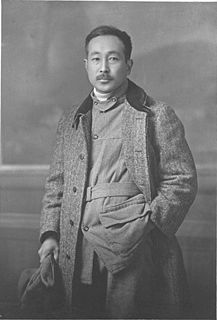 W
WRyūnosuke Akutagawa , art name Chōkōdō Shujin (澄江堂主人), was a Japanese writer active in the Taishō period in Japan. He is regarded as the "father of the Japanese short story", and Japan's premier literary award, the Akutagawa Prize, is named after him. He died by suicide at the age of 35 through an overdose of barbital.
 W
WTakeo Arishima was a Japanese novelist, short-story writer and essayist during the late Meiji and Taishō periods. His two younger brothers, Ikuma Arishima (有島生馬) and Ton Satomi (里美弴), were also authors. His son was the internationally known film and stage actor, Masayuki Mori.
 W
WOsamu Dazai was a Japanese author who is considered one of the foremost fiction writers of 20th-century Japan. A number of his most popular works, such as The Setting Sun (Shayō) and No Longer Human, are considered modern-day classics in Japan. With a semi-autobiographical style and transparency into his personal life, Dazai's stories have intrigued the minds of many readers.
 W
WTamiki Hara was a Japanese author and survivor of the bombing of Hiroshima, known for his works of Atomic bomb literature.
 W
WAshihei Hino was a Japanese author, who wrote about military life during World War II. He was born in Wakamatsu and in 1937 he received the prestigious Akutagawa Prize for one of his novels, Fun'nyōtan . At that moment he was a soldier for the Japanese army in China. He then got promoted to the information corps and published numerous works about the daily lives of Japanese soldiers. It is for his war novels that he became famous during the war. His book Mugi to Heitai sold over a million copies.
 W
WYasunari Kawabata was a Japanese novelist and short story writer whose spare, lyrical, subtly-shaded prose works won him the Nobel Prize for Literature in 1968, the first Japanese author to receive the award. His works have enjoyed broad international appeal and are still widely read.
 W
WYukio Mishima , born Kimitake Hiraoka was a Japanese author, poet, playwright, actor, model, Shintoist, nationalist, and founder of the Tatenokai . Mishima is considered one of the most important Japanese authors of the 20th century. He was considered for the Nobel Prize in Literature in 1968, but the award went to his countryman and benefactor Yasunari Kawabata. His works include the novels Confessions of a Mask and The Temple of the Golden Pavilion as well as the autobiographical essay "Sun and Steel". Mishima's work is characterized by "its luxurious vocabulary and decadent metaphors, its fusion of traditional Japanese and modern Western literary styles, and its obsessive assertions of the unity of beauty, eroticism and death."
 W
WHidemitsu Tanaka was a novelist of the Buraiha genre in Shōwa period Japan. His name was also pronounced "Tanaka Eiko" on occasion.